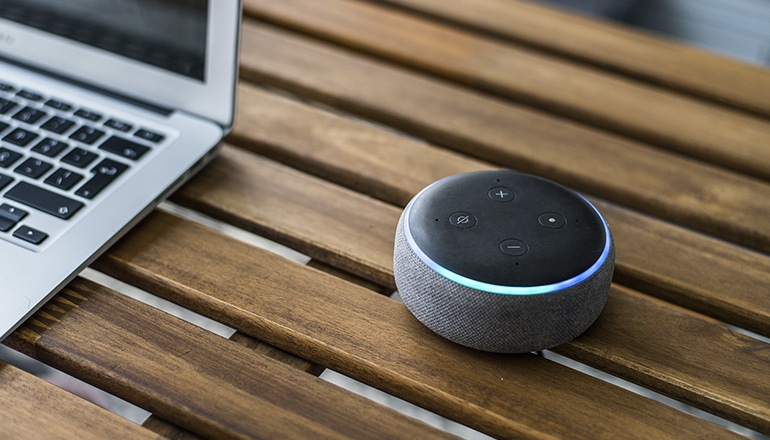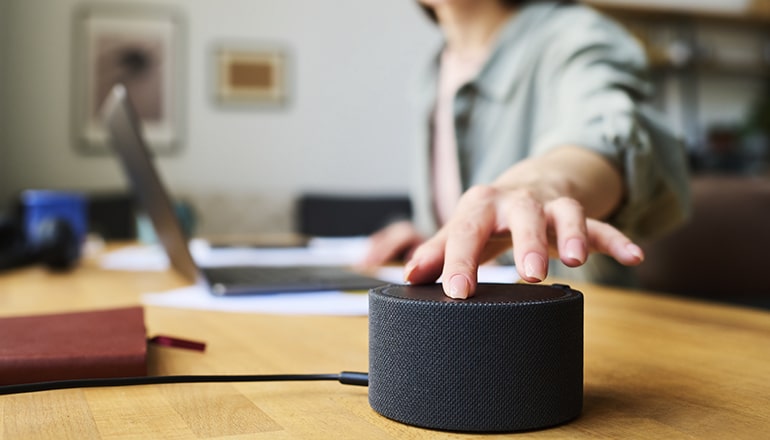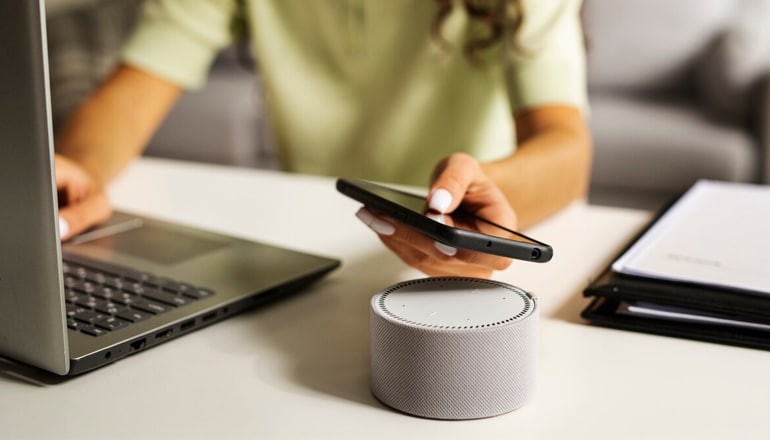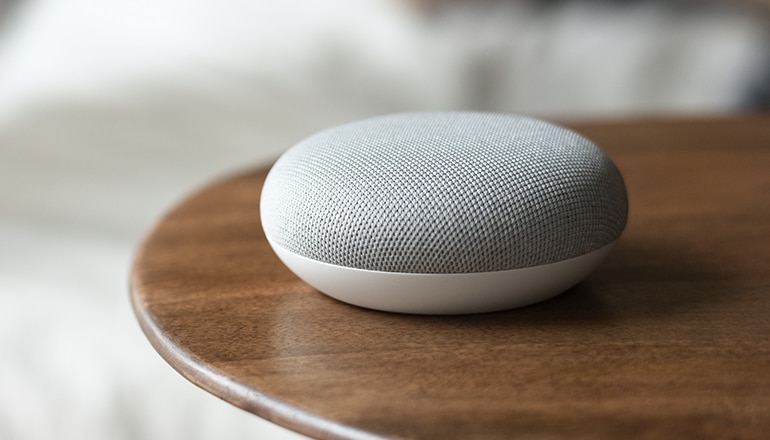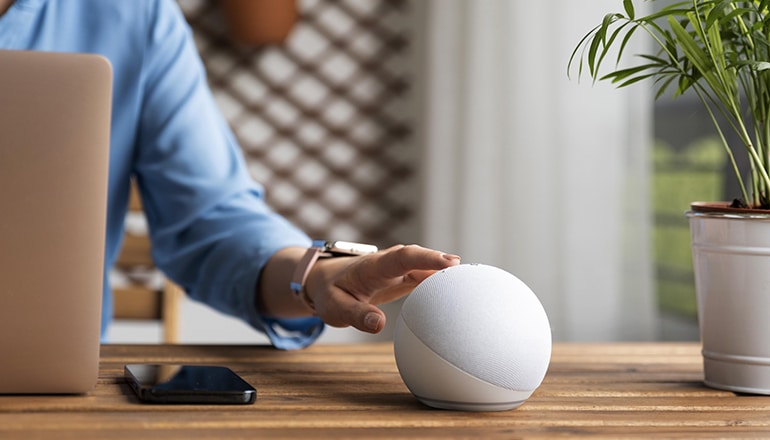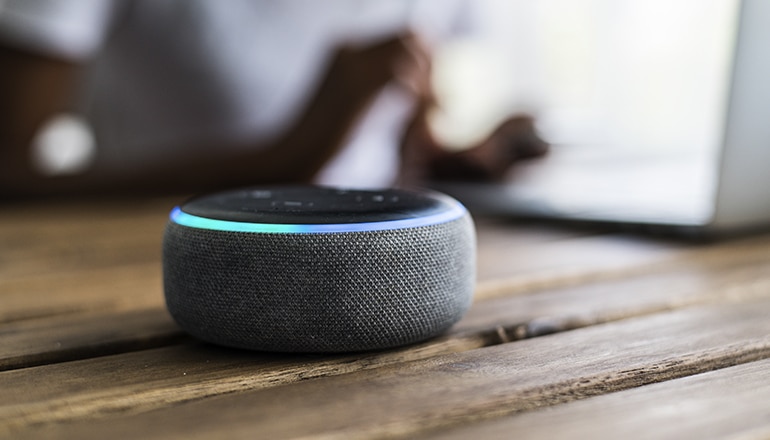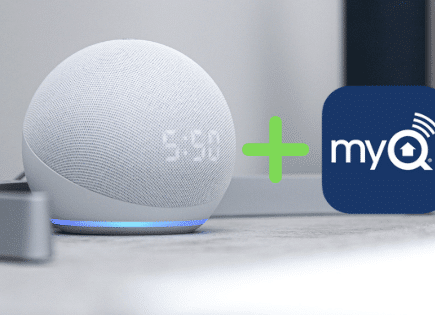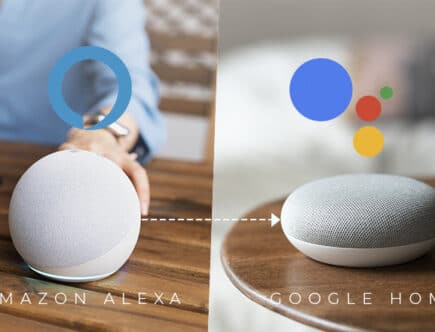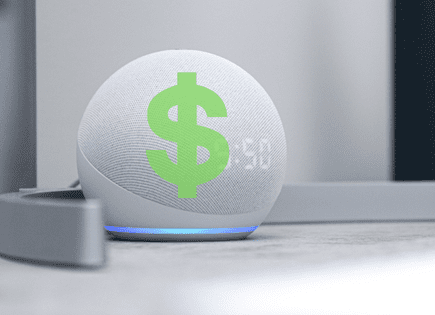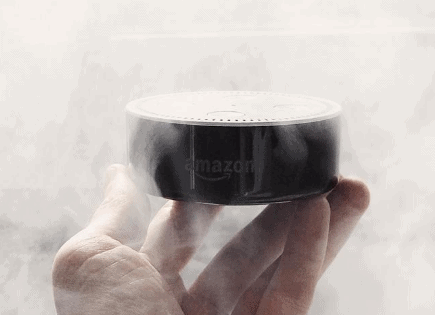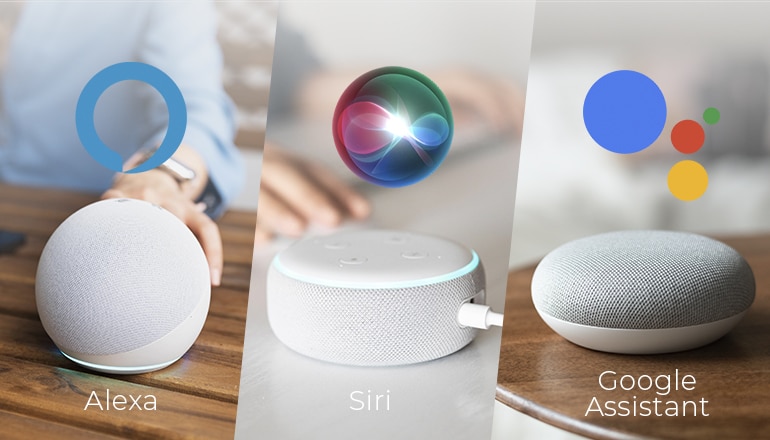
Alexa vs Siri vs Google Assistant: Which is Best in 2024?
You’re likely familiar with popular names like Alexa, Siri, and Google Assistant. Most of us ask our digital pals to play our favorite songs, answer questions, or control our modern homes every day.
Still, have you ever stopped to think about which one of these smart helpers shines?
Could Alexa stand out with her wide variety of skills? Maybe Siri, who claims to understand context better than the rest? Or Google Assistant, proud of its vast search engine knowledge?
This isn’t just about who’s the best; it’s about finding the right match for your online routines. We’ve all picked the wrong hardware at some point or another and regretted our choices; guides like these help show the pros and cons of each option so you know what you’re getting yourself into before you outfit your home with these devices.
We’ll cover each one and compare them in various categories: how well each assistant works with different gadgets, the costs of various devices, the special features each assistant has, and more! Let’s do it.
Comparing AI Personal Assistants
Alexa, Siri, and Google Assistant have recently become household names. But what exactly are they? Essentially, these assistants are driven by AI, which enables them to comprehend and react to voice instructions.
Alexa is Amazon’s voice-activated helper that powers devices like the Echo Dot. It can play music, set alarms, or even tell you a joke. Similarly, Siri is Apple’s assistant found on iPhones and iPads. This chatty companion does more than just answer questions – it also sends messages for you.
Then there’s Google Assistant – Google’s equivalent of Alexa and Siri. You’ll find this friendly face on Android phones and smart speakers like the Google Home Mini.
- Siri: Known for its quirky responses to silly questions.
- Alexa: Renowned for its compatibility with a wide range of devices.
- Google Assistant: Famous for providing highly accurate search results due to its access to Google’s vast data troves.
The real magic happens when these virtual pals connect with other smart home tech. They turn your living room into a command center where lights flicker at your word or heating adjusts as you wish. Imagine saying “Goodnight,” only for all lights to dim while soft lullabies fill the air – welcome home indeed.
Device Compatibility
The compatibility of a smart assistant with various devices is critical to its effectiveness. Let’s examine Alexa, Siri, and Google Assistant.
Alexa, Amazon’s voice assistant, shines regarding device compatibility. She’s everywhere, from Echo speakers to Fire TV sticks and even third-party gadgets like Bose headphones or Fitbit trackers. Amazon maintains a list of compatible devices, showing this tech’s adaptability.
Moving on to Siri. If you’re an Apple fanboy (or girl), then Siri will play nicely with your gear. But outside the orchard? Not so much. iPhone, iPad, Macbook – these are her playgrounds.
Last but not least – Google Assistant. As expected from the search giant’s offspring, GA has wide-ranging support for Android phones and tablets as well as Chromebooks. But did you know that it also extends help across many non-Google products?
So, what does this mean for you as a user?
- If variety is your spice of life, Alexa might be your best bet.
- For those fully invested in the Apple ecosystem, Siri is a no-brainer.
- If you’re an Android aficionado or simply want a mix of devices, Google Assistant has got your back.
Your selection will significantly be based on the devices you possess and how smoothly they need to collaborate with each other. Because, at the end of the day – it’s all about making tech work for us.
Cost and Hardware Selection
Choosing between Alexa, Siri, or Google Assistant also means deciding on the smart home ecosystem you want to invest in. The cost varies based on your hardware choice.
The Echo Dot, Amazon’s most affordable device, is great for starting off with voice assistance. But if high-quality audio matters to you more than budget-friendly options, consider the pricier Echo Studio. We wrote a guide on the cost of Alexa here.
Siri runs exclusively on Apple’s premium-priced HomePod devices. They offer superb sound quality but may not fit into everyone’s budget.
If price-to-performance ratio is key for you, Google offers several choices, from the wallet-friendly Nest Mini to its top-of-the-line Nest Audio speaker.
So, it’s not just about picking an AI assistant; it’s also about choosing compatible devices that match your needs and pocket. Each of these platforms offers a range, but remember, higher quality usually comes with a heftier price tag.
Skills and Abilities
When it comes to the smart home arena, the skills and abilities of our digital helpers are crucial. Let’s put Alexa, Siri, and Google Assistant under a microscope.
Alexa has over 100,000 skills, ranging from controlling your lights to ordering pizza. But what sets her apart is third-party support. She can work with various apps or services that you might already use.
Siri excels in integration with Apple devices thanks to HomeKit compatibility. If you’re deep into the Apple ecosystem – think iPhone, iPad, or Macbook – Siri could be your best buddy for automating tasks across these platforms.
Google Assistant shines when it comes to understanding complex instructions and delivering accurate results due to its superior language processing capabilities.
If trivia nights are more your thing or if “Hey Google. How do I fix this?” sounds like something you’d say often, consider GA as a serious contender.
- If you want quick answers, Go for Google Assistant.
- If tight-knit device synchronization is what you need, Say Hi to Siri.
- To get more out-of-the-box functionality & wide app support, Give Alexa a nod.
All three have their unique strengths based on different needs, which makes picking one over another tricky but not impossible – after all, who said tech decisions were easy?
Privacy and Security
Your smart assistant is like a close friend who knows all your secrets. But how much of that information does it keep to itself? Let’s discuss privacy concerns for Alexa, Siri, and Google Assistant.
Alexa collects data to personalize experiences but also uses encryption methods for safety. Amazon assures users they can delete voice recordings or use the mute button when not in use. They are also easy to turn off and adjust privacy settings – for example, you can read our guide on how to turn off the Alexa Show’s screen here.
Siri prides itself on user confidentiality. With its commitment to privacy, data stays on devices rather than cloud storage as often as possible. But there are still some doubts; if you’re concerned about what Siri hears, you might want to turn off the “Hey Siri” listening mode.
The phrase “Google knows everything” could scare anyone. Luckily, Google takes steps towards securing user data with robust security measures like two-step verification processes and safe browsing protection. However, Google does collect substantial amounts of personal info. It claims this helps deliver better service, but don’t forget—you have control over your settings.
Remember—privacy isn’t just about them; it’s also about us. We must guarantee we’re content with how much our digital aides are engaged in our lives.
User Experience
When it comes to choosing a smart assistant, the user experience is critical. How does each one stack up? Let’s dive into Alexa, Siri, and Google Assistant.
Amazon’s Alexa shines in her ability to follow complex commands. She integrates seamlessly with Amazon devices and services. But sometimes, Alexa can get tripped up by accents or background noise.
Siri has always been praised for its friendly tone and quick wit – something that helps create an engaging user experience. However, Siri might not be as capable as others when dealing with multi-step tasks.
If there’s one thing Google Assistant excels at, it’s context-based queries, thanks to Google’s vast search data pool. It also offers more personalized help based on your daily routines.
To summarize:
- Ease of Use: All three assistants are relatively easy to use but vary slightly in their command recognition abilities.
- Responsiveness: While all offer instant responses, interruptions can affect how well they perform these tasks. For instance, loud environments may cause hiccups in understanding voice commands.
- Versatility: The best pick here would depend largely on which ecosystem you’re already invested in – Apple (Siri), Amazon (Alexa) or Google (Assistant).
User experiences will differ depending on individual preferences and device compatibility.
Note: This analysis is based on firsthand usage of these AI personal assistants across various platforms.
Language Support
The battle of language comprehension is crucial in the arena of AI assistants. With more languages comes greater accessibility and usability.
Amazon’s Alexa shines when it comes to language support. According to official Amazon documentation, Alexa can understand English, German, French, Italian, Spanish, and Japanese among others.
Siri isn’t far behind, either. It supports 21 languages, including Chinese (Cantonese), Dutch, and Russian. But with a multitude of accents within each language – does Siri really understand you? That’s a question for another day.
Last but not least – Google Assistant claims it understands up to 44 languages. More than just numbers, though; understanding context and local idioms matters too.
To recap:
- Alexa: Supports multiple major languages but could use some improvement in accent recognition.
- Siri: While supporting fewer total languages compared to Google Assistant or even Alexa, for that matter, she certainly holds her own due to superior natural language processing abilities.
- Google Assistant: Not just the sheer number of languages, but its understanding of different dialects and regional accents is commendable.
In a world that’s increasingly globalized, our digital assistants need to be linguistically adept. They have to be able to give us assistance regardless of our origin or the way we articulate.
Future Developments
Looking ahead, let us contemplate what the future holds for Alexa, Siri, and Google Assistant in terms of technological advancements. With technology progressing at a breakneck speed, these AI assistants are set to get smarter and more intuitive.
Amazon is keen on making Alexa more proactive, enabling it to predict user needs even before they ask. Think about Alexa reminding you to order your favorite pizza just when you’re wondering what’s for dinner.
Siri seems poised to take personalization up a notch with its newest features, like Assistive Touch. Apple plans include allowing Siri not only to remember preferences but also to recognize the voices of different family members – that means personalized responses for everyone. So, no worries if mom likes classic rock while dad digs jazz; Siri will know who’s asking. How cool is that?
The future holds promise as Google strives to perfect its assistant’s attention-to-detail skills. Akin to having an efficient secretary right inside your device, Google aims are trained to predict next steps based on current tasks or queries – think auto-scheduling follow-ups after meetings or suggesting recipes based on past searches.
This isn’t sci-fi anymore; our AI companions are evolving rapidly from answering simple questions to anticipating our needs. With these upcoming enhancements, it seems like the future is knocking on our doors a bit sooner than expected!
Making the Choice
When choosing a smart assistant, it’s important to contemplate your individual requirements and tastes.
Do you prioritize compatibility with devices? Or maybe cost matters more?
Let’s dive deeper into these considerations:
If you’re all about variety in device choices and love being able to ask quirky questions, Alexa could be your go-to gal. With her wide range of compatible devices like Echo Dot or Echo Studio, she can fit into any corner of your home.
But for those heavily invested in the Apple ecosystem and desiring seamless integration across their iDevices, Siri may take the cake. Her ability to work flawlessly on iPhone or HomePod gives her an edge if you’re a die-hard Apple fan.
Google Assistant, however, might win over those who value robust search capabilities powered by Google’s massive data engine. If accuracy is what matters most when asking factual questions, GA should be at the top of one’s mind.
Here’s my summary:
- Alexa: Best for diverse hardware selection & personality-filled interactions.
- Siri: Ideal choice for dedicated iOS users seeking tight-knit device integration.
- Google Assistant: Fits well with seekers of accurate answers backed by Google’s vast information network.
No single assistant is perfect for everyone – pick the one that best suits your needs and tech setup. It boils down to which assistant best aligns with your specific needs and tech ecosystem. Choose wisely, and you’ll have a digital buddy that makes life just a little bit easier.
Conclusion
That’s a wrap on Alexa vs Siri vs Google Assistant!
You’ve now got the lowdown on device compatibility, cost, and hardware options. You understand the unique skills and abilities each assistant brings to your smart home.
Alexa, with her vast array of skills. Siri understands context like no other. And Google Assistant, armed with an unrivaled knowledge base.
Privacy concerns? Check! We covered how they handle your data, too. Don’t forget language support and future developments in store for these digital assistants.
The choice is yours! Each one has its positives and negatives; it ultimately comes down to which works best with your digital lifestyle. Now go forth – let technology serve you better!


